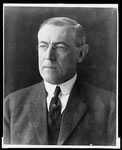|

|
United States Entry into World War I: Some Hypotheses About U.S. Entry
Introduction
Share with the class the handout “Why
Did the United States Enter World War I?” on pages 1-2 of the PDF file (see
Preparing
to Teach This Unit, in the curriculum
unit overview, for download instructions). For convenience, the document is
transcribed below. Discuss the various hypotheses listed below and in the PDF
files with supporting documentation. See if class members have any other hypotheses,
including combinations of two or more listed on the handout. Then, based on what
students know at this point, take a poll. Which hypothesis does each student support?
Guiding Question:
What is the most compelling evidence explaining why the U.S. entered World War I?
Learning Objective
After completing the lessons in this unit, students will be able to:
- Take a stand on a hypothesis for U.S. entry into World War I, supported by specific evidence.
1. Because the U.S. was under attack despite its neutrality?
The present German submarine warfare against commerce is a warfare against all mankind....Our motive will not be revenge or the victorious assertion of the physical might of the nation, but only the vindication of right, of human right, of which we are only a single champion....Armed neutrality, it now appears, is impracticable.
—President Woodrow Wilson's War Message (April 1917)
It would be the resumption of unrestricted submarine warfare that would ultimately bring the United States into the war.
—The Gilder Lehrman Institute of American History
2. To make the world “safe for democracy”?
Our object...is to vindicate the principles of peace and justice in the life of the world as against selfish and autocratic power.... We are glad...to fight...for the ultimate peace of the world and for the liberation of its peoples, the German peoples included: for the right of nations great and small and the privilege of men everywhere to choose their way of life and of obedience. The world must be made safe for democracy....
—President Woodrow Wilson's War Message (April 1917)
3. Because we would have faced economic collapse if the Allies could not pay back all the loans made to them by American bankers?
…We have loaned many hundreds of millions of dollars to the Allies in this controversy. While such action was legal and countenanced by international law, there is no doubt in my mind but the enormous amount of money loaned to the Allies in this country has been instrumental in bringing about a public sentiment in favor of our country taking a course that would make every bond worth a hundred cents on the dollar and making the payment of every debt certain and sure.
—Senator George W. Norris in Opposition to President Woodrow Wilson's War Message
(April 4, 1917)
We didn't win a thing we set out for in the last war. We merely succeeded, with tremendous loss of life, to make secure the loans of private bankers to the Allies.
—Senator Gerald Nye of North Dakota, Chairman of the Senate Munitions Committee (circa 1936)
Beginning in 1916, the Morgan negotiated a series of extremely large loans to France and to England, becoming their exclusive purchasing agent and financier in the United States.
—Notable American Volunteers of the Great War, Great War Primary Documents Archive
By 1917, American loans to the Allies had soared to $2.25 billion; loans to Germany stood at a paltry $27 million.
—The Gilder Lehrman Institute of American History
4. Because it was good for business?
…through the instrumentality of others who have not only made millions out of the war in the manufacture of munitions, etc., and who would expect to make millions more if our country can be drawn into the catastrophe…
—Senator George W. Norris in Opposition to President Woodrow Wilson's War Message (April 4, 1917)
To what extent was America's war a war for business? Did Woodrow Wilson lead America into war in order to serve the selfish interests of the few? The answer is determined by looking into the essential facts. In the first place, Wall Street wanted war.
American participation in the war against Germany would constitute the most tremendous and profitable coup in the history of American finance… The war created 21,000 new American millionaires and during the war period, 69,000 men made more than three billion dollars over and above their normal income… It would have been quite impossible for President Wilson to have begun a war really intended to 'make the world safe for democracy' without facing the united opposition of Wall Street.
—John Kenneth Turner, Shall It Be Again? 1922
5. Because of cultural, historical, and economic ties to Great Britain?
The failure to treat the belligerent nations of Europe alike, the failure to reject the unlawful "war zones" of both Germany and Great Britain is wholly accountable for our present dilemma.
—Senator Robert M. LaFollette in Opposition to President Woodrow Wilson's War Message
(April 4, 1917)
6. Because of anti-German sentiment influenced by historic ties to England, German policies, and American and British propaganda?
…a large number of the great newspapers and news agencies of the country have been controlled and enlisted in the greatest propaganda that the world has ever known to manufacture sentiment in favor of war.
—Senator George W. Norris in Opposition to President Woodrow Wilson's War Message (April 4, 1917)
7. The result of the expansion of the U.S.'s armed forces and weaponry?
That which has driven the masses of Europe into the trenches and to the battlefields is not their inner longing for war; it must be traced to the cutthroat competition for military equipment, for more efficient armies, for larger warships, for more powerful cannon. You cannot build up a standing army and then throw it back into a box like tin soldiers.
—Emma Goldman, from "Preparedness: The Road to Universal Slaughter"
8. For another reason?
9. For a combination of reasons?
Assessment
Print out and copy the PDF files for students to complete, by circling the reason they find most compelling and highlighting or listing the supporting documentation.
Standards Alignment
View your state’s standards
|





